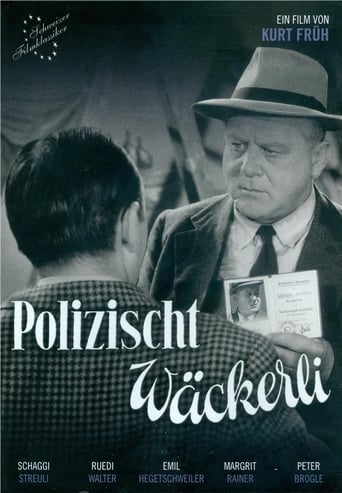Ginger
Very good movie overall, highly recommended. Most of the negative reviews don't have any merit and are all pollitically based. Give this movie a chance at least, and it might give you a different perspective.
semiotechlab-658-95444
Although the last Wäckerli-movie was made as late as 1966 (directed by nobody else than Werner Düggelin), the first one - and at the same time the first feature-long movie by Swiss director Kurt Früh - was an anachronism. Although the TV broadcasting of "Polizischt Wäckerli", which preceded almost immediately the movie, was a road sweeper, and the public liked both versions, most critics went against Wäckerli as the impersonation of the allegedly typical Swiss family father: with "tough shell and soft kernel". The 60ies were obviously visible at the horizon. Comparing Früh's three movies "Polizischt Wäckerli" (1955) - "Es Dach Überem Chopf" (1962) and "Der Fall" (1971) we easily get a socio-gram of the earthquake-like changes that happened at that time in Central Europe in the relationship between parents and children. While in 1955, the suppressed son, forced by his father, the almost almighty police-corporal of Allenwil, to hire out in a bureau-job which he hates as one can just hate, he is unable to free himself and needs for that purpose the help of his 10 years older girlfriend Mary, the owner of the local bar. The daughter and the mother have simply nothing to say. When they try to open their mouth, they are cut brutally ("but justly") down by Wäckerli's "natural authority". But only 7 years later, we see the 18 years old daughter Sophie Caduff in Früh's "Es Dach Überem Chopf" taking her own rights with conviction, spending whole nights with the then so-called generation of "Halbstarken" (mostly rockers). Although Sophie's father still tries to exercise his influence on her, the audience sees his might crumbling apart like Blue cheese. And again a decade later, in Früh's last film "Der Fall", we see a youth completely liberated from their families. When detective Grendelmeier by chance stumbles over the lost daughter of one of his clients, he sees her lying between one the stairwell, hypnotized by drugs. To his recommendation she might go home because her parents expect her, she answers in a flower-power drivel: "I don't believe that at all". This is the time-horizon from which "Polizischt Wäckerli" has to be judged: It basically describes a time which was already over when the movie was made. The mood that should be broadcast to the public was about that of the title-score of Früh's other movie "Oberstattgass": "In Allen Gassen Wohnt Das Glück" ("All The Alley Inhabits The Luck ...), in other words nothing else than the Gegenwelt of the Romantics. However, this is not Kitsch but Seelentröstung: consolation of the soul, of the wounded soul.

